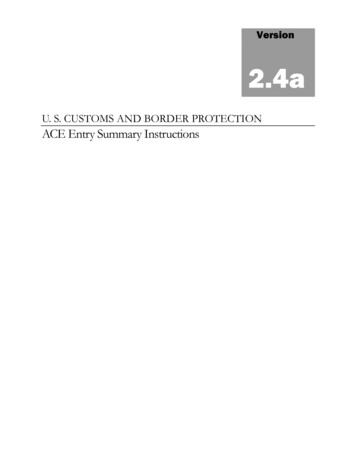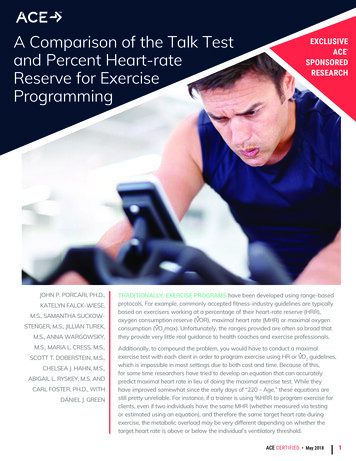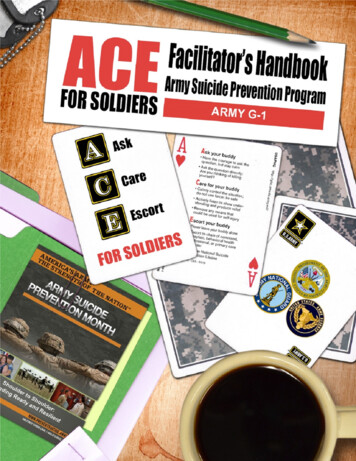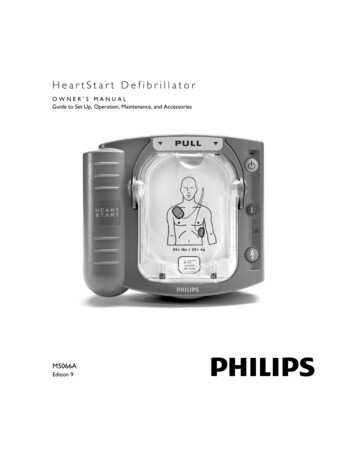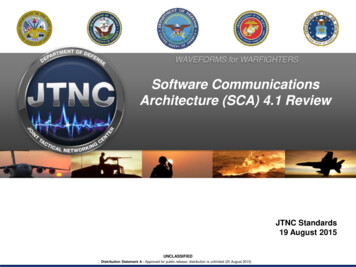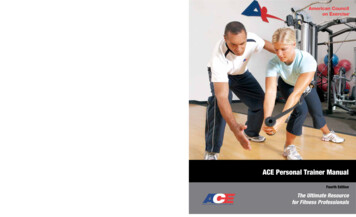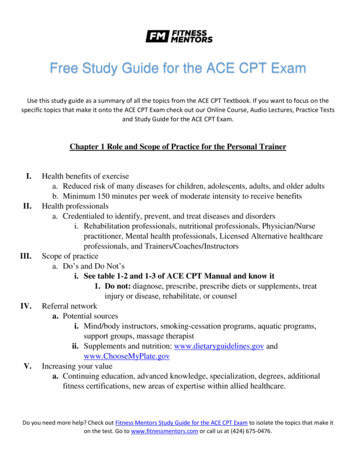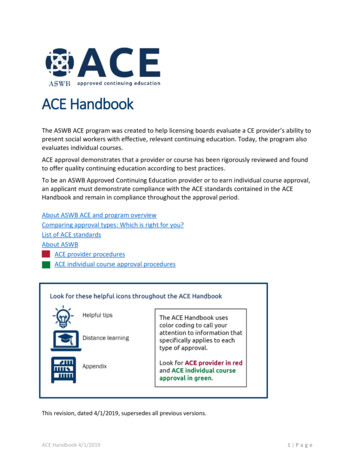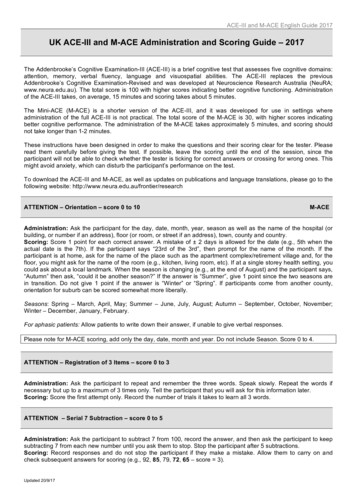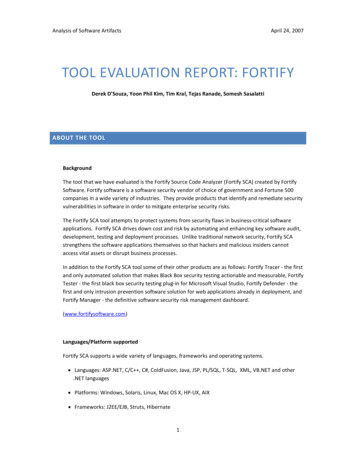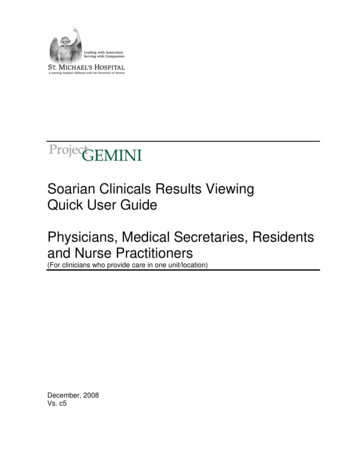![NRCDV-ACE-DVwebinar-SCA-March2017[2] - VAWnet](/img/36/nrcdv-ace-dvwebinar-sca-march2017.jpg)
Transcription
3/15/17March 21, Strengths- sTheACE- ce(ACE- ‐DV)toenhanceourworktoenddomesDcviolence.Goals PromotetheleadershipofACE- d. atedtothisissue. Supportthedevelopmentoftrauma- ‐informed,culturally- ‐responsive,asset- pracDceimpacDngchildrenexposed.1
3/15/17Beliefs1. . perience.3. condoningtheirbehavior.4. h.5. Ournon- es.6. hiWingtheparadigm Traumaisacommonhumanexperience Resilienceisaninnatehumancapacity Thedeficitmodelisincomplete CenteredAdvocacy:Strengthening Hope & Resilience forChildren,Youth, and Mothers inDomestic Violence ProgramsPresented by Julie Havener, LMHPFriendship Home of Lincoln2
3/15/17Thank you for what you do!“Hope has two beautifuldaughters; their namesare Anger and Courage.Anger at the way thingsare, and Courage to seethat they do not remain asthey are.”- Augustine of Hippo (354-430)One communal livingshelter (8 bedrooms) Twelve single familyshelters Seven transitionalshelter units Pre-shelter Program Continued Contact Women’s and children’s advocacy Case management Short term mental health counseling Women’s and children’s groups Strengths-Centered Advocacy3
3/15/17Goals for Today’s Webinar Highlight the power of resilience and focusingon strengths and its role in the healing processof survivors. Provide overview of Strengths-CenteredAdvocacy and Gallup tools for discoveringnatural talent at any age. Encourage new thinking, ideas and inspiration inyour role as advocates and in your personal life!“At times our own light goes out and isrekindled by a spark from another person.Each of us has cause to think with deepgratitude of those who have lighted theflame within us.” — Albert SchweitzerSelf Reflection: Who Inspired YOU?Reflect upon an adult during yourchildhood/adolescent years whoacknowledged what was right withyou and had a powerful positiveimpact on you.4
3/15/17Think about the following Who was the person? What did they do? How did it affect you?Group SharingWhat are some of the qualities/characteristics of the individualwho came to mind?Group SharingWhat kinds of qualities did thisperson’s influence help producein you?5
3/15/17Strengths-Centered Advocacy:What is it? A multi-layered approach to providingindividualized, empowering and strengths-basedsupport and services to survivors ofdomestic violence and their childrenAND an approach that creates a more supportive,positive , empowering work environment foradvocates.SCA: How it started Idea born at conference2000: Friendship Homereceives a 3 year grantPartnership with GallupFirst domestic violenceshelter to use CliftonStrengthsFinder withvictims of intimatepartner violenceAnd how it has grown Strengths-CenteredAdvocacy: SCA curriculum & toolkits forsurvivors & advocates, strengths-based approachspecific to working withsurvivors, honors & supports roots ofadvocacy work and multi-layered benefits.6
3/15/172nd World Conference of Women’sSheltersFebruary 2012 Washington, DCStrengths-Centered AdvocacyTraining OverviewDay One Day TwoOverview of StrengthsCentered Advocacy & Ethicaluse in DV programs Exploring your Strengths Creating a Strengths-BasedCulture Creating a Positive Workplace Building Strong Work Teams The Importance of Self Care/Remembering Why We’reHere Building StrengthsCentered Advocacy intoServicesStrengths- Centered Advocacy:What is it?Empowermentbased servicesPositivePsychologyCliftonStrengthsFinder (or another strengthsdiscovery tool )7
3/15/17Positive Psychology Positive Psychology: the scientific study of thestrengths and virtues that enable individuals andcommunities to thrive and find happiness-Webster’s New Millennium Dictionary of English “Psychology is not just the study of weaknessand damage, it is also the study of strengthand virtue.Treatment is not just fixing whatis broken, it is nurturing what is best inourselves.” – Martin Seligman, PhDKey research for advocates Trauma & Resiliency: Dr. Donald Meichenbaum, Ph.D.,found that people recover more easily from trauma when they areable to identify and use their strengths. Korean War POW case study: Donald Clifton’sreview of this case study on the deadly effects of “relentlessnegativity” led him to begin the movement to focus on what is rightwith people. Martin Seligman’s research: Seligman found thatusing personal strengths as a therapeutic intervention fordepression, works as well as or better than traditional interventionsof cognitive behavioral therapy, medication, or a combination ofboth.Perhaps the most important outcomefor our work as advocatesRestoring a sense ofHOPE Inoneself In the future In others8
3/15/17Research: Benefits of Hope Improved well-beingIncreased successIncreased purpose-driven actionPositive correlation with health &longevityHope does not depend on income level or IQHope can be learned!Source: Lopez, S. Making Hope Happen, 2013Core Beliefs of the Hopeful The future will be better than the present I have the power to make it so There are many paths to my goals None of them is free of obstaclesSource: Lopez, S. Making Hope Happen, 2013Strengths-Centered AdvocacyCore BeliefsFocusing on strengthsCelebrating individualityBeginning with self discovery9
3/15/17SCA Basic StepsDiscoveryApplicationGrowth &EvolutionTools for Discovering TalentAges15throughadultAges10-14Agesunder1010
3/15/17Clifton StrengthsFinder basics Developed by GallupResearch-basedAge 15 – adultOnline assessmentPurchase books/codes for 15/personAvailable in 22languagesSample StrengthsFinder QuestionClifton StrengthsFinder basics Measures TALENT that can be developedinto STRENGTHTalentInvestmentStrength11
3/15/17What are the “results”? Identifies “Top 5” (out of 34) themes oftalent Individualized descriptions of top 5 Ideas for developing each talent into astrengthClifton Youth StrengthsExplorer Available since 2007 Ages 10-14 Identifies 10 themesof talent Online assessment(15-20 minutes) Cost: 9.99 throughGallupSample StrengthsExplorerQuestions When someone is left out I include themOther people count on meI am more often happy than seriousI have to winI hate being lateRespond with:q Almost Alwaysq Oftenq Sometimesq Almost Never12
3/15/17What are the “results?” Report with “top 3” (out of 10)strengths and descriptions of each Action items for youth Action items for adults Youth workbook Parent GuideStrengthsSpotting Gallup’s model for finding talents inchildren younger than 10 years old Based on Clifton Youth StrengthsExplorerthemes as foundation Relies on repeated observations of youngchildren in variety of settings andinteractionsA Great Resource Includes codes foroneStrengthsFinderand oneStrengthsExplorerCost: 24.9913
3/15/17Using Strengths-Centered Advocacyto Encourage Resilience and HealingA few important points aboutchildren & youth Children/youth are more than“witnesses”- they experience domesticviolence on many different levels. Not ALL children/youth are traumatizedthey are affected in various ways and tovarious degrees.A few important points aboutmothers Many women are able to parent as well asnon-abused mothers despite the numerousobstacles. Women frequently find creative ways toparent their children the way they want towhen the battering parent is not present. Parenting often improves once the motherand children are safe.14
3/15/17Potential Effects on Children/Youth Guilt & self-blame Isolation & feeling alone Decreased ability to express feelings inhealthy ways Negative core beliefs about self & others Inability to trust (the world is dangerous)Source: l Effects on Children/Youth Interference with healthy brain development Sleep problems/nightmares PTSD Increased aggression/overly compliant Engaging in risky behaviors (substance use,sexual behaviors, criminal activity, etc.)Source: ized Symptoms AggressionDecreased empathy forothers Restlessness Impulsivity Academic difficultiesBehavioral difficultiesRegression, developmentdelays Internalized Symptoms DepressionAnxietyFearfulness Withdrawn/inhibitedbehavior Shame & self-blamePTSDLow self-esteem Source: http://promisingfutureswithoutviolence.org15
3/15/17Potential Effects on Children/YouthEffects can be: ImmediateOngoingLong-termImage from New Mexico Coalition AgainstDomestic Violence www.nmcadv.orgSome Potential Effects on Mothers Focus on safety/survival vs. nurturing Mental health/substance use issues Erosion of authority Not acknowledging extent of effects Breakdown in communication Altered/controlled parenting style“Although theworld is full ofsuffering, it isalso full ofovercoming it.”- Helen Keller16
3/15/17What is Resiliency? the ability to “bounce back” and copeeffectively in the face of adversity reflects the ability to transform one’semotional pain into something positive a trait that can be nurtured, developed andlearnedSource: Michenbaum, D. Important Facts About Resilience, 2011Post-Traumatic GrowthPositive personalchanges resultingfrom the struggleto deal withtrauma and itsconsequences.Post-Traumatic Growth Renewed appreciation of life Commitment to live life to the fullest &value each day Improved relationships with loved ones Search for new possibilities Enhanced personal strengths New spiritual changes17
3/15/17Characteristics of ResilientChildren & Youth Easy-going temperamentProblem-solving skillsSocial competenceAutonomySense of purpose & future orientationOptimismAcademic & social successesSource: Michenbaum, D. Understanding Resilience in Children & Adults,Critical Elements for Healing Physical & emotional safety in currentenvironment Structure, limits, predictability Strong bond to non-battering parent Not feeling responsible for adults Strong bond to siblings IF SAFE, protected contact w/ nonbattering parentSource: Bancroft & Silverman, Assessing Risk to Children from Batterers, 2002Protective Actions Mothers TakeComplianceMinimize/distract/normalize Keeping abuse secret Taking blame Sending children away Encourage drinking/use (batterer) Enduring severe violence Disciplining children more severely 18
3/15/17Power & control wheel (s) Use one that Heather has from Praxis?(cite resource)Strengthening the Mother-ChildBond is Critical!Self-Reflection What personal talents orstrengths do you use most inyour parenting or in yourinteractions with children/youth in your life?19
3/15/17Strengths-based parenting involves: Helping mothers understand how theirstrengths influence their parenting style Encouraging mothers to look for theirchildren’s talents & strengths Shifting from judgment to understanding Approaching women from their strengthswhen addressing parenting issues Language we use with each otherAddressing Parenting Concernsq Acknowledgethe difficulty/challenges ofparenting in shelterq Recognizewhat she is doing RIGHT/wellas a motherq Expressyour concern (be specific) andask for her thoughts/feelingsq Askher how staff can helpIF she has taken StrengthsFinderBefore approaching her with your concern,thoughtfully review her SF report and reflecton conversations you have had with her How can you use this information to helpyou understand her as a mother moreeffectively?How might this information help you inthinking about your approach?20
3/15/17Using Strengths-CenteredAdvocacy with Children andYouth in Your Program“ The way we talk to ourchildren becomes their innervoice.”- ‐ Peggy O’MaraSCA: Benefits for children/youth Builds positive self conceptStrengthens a sense of hopeStrengthens resilienceHelps mothers to parent from theirstrengthsHelps mothers to see & recognize theirchild’s strengths21
3/15/17“While at Friendship Home, my daughter wasable to learn what her strengths are.This reallyhelped her, but it also helped me as hermother! I pay more attention to her strengthsnow and encourage them. I understand whereshe is sensitive and approach her differently.She doesn’t talk about herself very often andthis has helped her to focus on herself in apositive way.” – Friendship Home residentOur primary goal To help children and youth feel more Visible Valued Hopeful EmpoweredEssential characteristics ofstrengths-based children’s advocacyIndividualizedStrengthsFocusedBuilt onPartnershipWelcomingPhysical &emotionalsafety22
3/15/17What were you like at 10?Ten StrengthsExplorer Themes Achieving Discoverer Caring Future Thinker Competing Organizer Confidence Presence Dependability RelatingAchievingYou have more energy and moregoals than other people.You love asense of accomplishment.23
3/15/17CaringIn your heart, helping people isvery important.You want to makethe world better by helping peoplein small ways or big ways.CompetingYou see many things in life as agame, and you feel great joy whenyou win.You truly hate to losebecause you are always striving forfirst place.ConfidenceYou believe in yourself and whatyou can do. This helps you take onchallenges because you feel sureyou can succeed.24
3/15/17DependabilityTrust is important to you, and youcare about being seen asresponsible and trustworthy.People count on you to do whatyou say you will do. When youmake a promise, you mean tokeep it.DiscovererA thinker and a learner, you areexcited about exploring ideas andmaking connections.You like to askthe questions “How?” and “Why?”Future ThinkerYour mind loves to think anddream about the future.You are aperson who thinks about what ispossible, not what is impossible.25
3/15/17OrganizerScheduling, planning, and organizingyour world makes life better.People count on you to get thedetails right and pull a plantogether.PresenceYou were born to be at the frontof the room, telling stories andtaking the lead. Other peoplewatch you and listen to you.RelatingYou like to start friendships andkeep them for a long time- maybeeven your whole life.You widenthe circle of friends for yourselfand others.26
3/15/17“ One of my strengths is Confidence.Thatmeans that I believe my thoughts and myself. Ichoose to do the right thing and be a leader,not a follower. Some people take the wrongpath but I find my own way.”– child at Friendship HomeQuestions that Point to Talent What activities or kinds of places do you love themost? (Yearnings) What skills/knowledge do you seem to pick upquickly? (Rapid learning) What challenges have you met that left you feelingenergized and fulfilled (Satisfaction) What activities do you enjoy so much that you losetrack of time when you’re doing them?(Timelessness)Source: Reckmeyer, M. Strengths Based ParentingAlternative Ways to IdentifyStrengths in Children/YouthDevelopmental Assets Profile (DAP)www.search-institute.org VIA Strengths Survey for du Child &Youth Resilience Measure (CYRM)http://www.resilienceresearch.org Other ideas/ways to measure strengths in children/youth?27
3/15/17Tips: Starting the journeyThings YOU can do Discover your own strengthsResearch the benefits of focusing on strengthsLearn about other people’s strengthsTips: Starting the journeyThings your agency can do: Begin a dialogue about strengths and its link toresilienceInvolve staff in generating ideasConsider the use of a strengths-discovery toolUse existing groups to help survivors focus onstrengthsRemember 3 steps of SCA: Discover,Application, Growth & LearningAnd remember 28
3/15/17Remembering Why We’re HereFor additional information tureswithoutviolence.orgContact InformationJulie Havener, LMHPPhone: (402) 437-9323Email: julieh@friendshiphome.orgThank You!!!29
3/15/17SourcesBancroft, L. & Silverman, J. (2002) Assessing Risk to Children from Batterers. RetrievedFebruary 28, 2014 from tviolence.orgLopez, S. J. (2013). Making Hope Happen. New York, NY: AtriaMichenbaum, D.(2011). Important facts about resilience: A consideration of researchfindings about resilience and implications for assessment and treatment. The MelissaInstitute for Violence Prevention and Treatment. Retrieved November 18, 2011from http://www.melissa baum, D. Understanding resilience in children and adults: implications forprevention and intervention. The Melissa Institute for Violence Prevention andTreatment. Retrieved November 18, 2011 from http://www.melissainstitute.orgReckmeyer, M. (2016). Strengths Based Parenting. New York, NY: Gallup enceAgainstWomen(VAWnet).Contactus:1- ‐800- ‐537- cdv.org/Tarequest.php30
shelter to use Clifton StrengthsFinder with victims of intimate partner violence And how it has grown Strengths-Centered Advocacy: !!!SCA curriculum & toolkits for survivors & advocates, strengths-based approach specific to working with survivors, honors & supports roots of advocacy work and ! multi-layered benefits.
